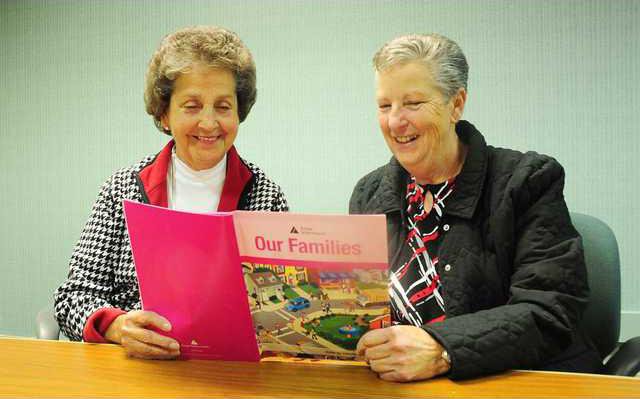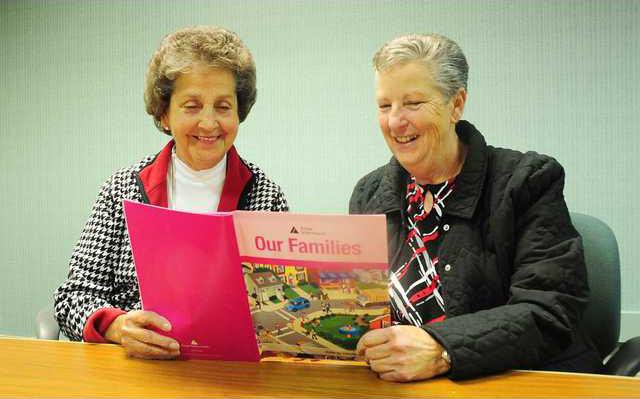Volunteer with Junior Achievement
Visit the website
Contact: 770 297 1222
The giving spirit
This holiday season, The Times each day spotlights a person or couple who give of themselves to help others in the community. Today, meet Evelyn Brown and Betty Gillespie, sisters who've spent their retirement years teaching with Junior Achievement.
When it comes to teaching children about families, sisters Evelyn Brown and Betty Gillespie have it down pat.
They've been doing it as a pair for years as part of Junior Achievement, an international program that teaches students about finances, entrepreneurship and professional skills.
The Junior Achievement curriculum goes along with what students are learning in their daily lessons.
The lessons are intended to inspire children to get jobs and succeed in the global economy, Brown said.
"It's just coming from a different perspective, they get more out of it. More than one teacher has said, ‘You've been in the real world, share your work experience with them,'" she said. "I even take my old black headset and put it on for them."
Brown and Gillespie grew up in Gainesville, attending Sardis Elementary School and South Hall High School, now home to Sardis Enrichment School and the DaVinci Academy.
Brown graduated first and came to work at Southern Bell. Gillespie joined her a year later. Both worked with their telecommunications
company until they retired in the mid-1990s.
The first year they retired, the two took weekly day trips to Dahlonega, Dillard and Clayton, enjoying the scenery and local eateries. Things changed in 1996, when Gillespie was diagnosed with breast cancer.
When she got better, she came with Brown to teach kids about the business world, and the rest is history.
"Somebody contacted our (TelecomPioneers) president and asked and so the president asked if we would do it," Brown said. "We said, ‘We'll try it." Then we fell in love with it."
The two started Junior Achievement in 1997 at Sardis, the same school they went to, teaching fourth and fifth grade. They've also taught at White Sulphur Elementary and Mount Vernon Elementary.
Though they enjoy every class they teach, first grade is their favorite. That's the one centered around families.
"The first lesson is the meaning of a family. We let every child in there, if they want, to tell us how many are in their family," Brown said. "The second time we go back, we talk about needs and wants. You define what a need is, what a want is, and then we have little activities with the children and let them decide. It gives them a totally different outlook."
The third lesson gets into money, discussing how wants and needs are paid for. The class also creates a community, illustrated with stickers, to show their knowledge of different parts of a business world, and they learn about the different types of money.
Brown said the pair tries to teach six Junior Achievement classes a year. They spend about eight hours a week volunteering and since they started, they've taught almost all of their grandchildren, great-nieces and nephews.
"We taught two classes this fall and we've got three coming up in the spring," she said.
When they teach, Gillespie said Brown does most of the talking. Her job is to pass things out, run activities and help answer questions.
"I've had more than one teacher say that some of the information we presented to them was actually on the (Criterion-Referenced Competency Test) and they felt it helped," Brown said.
Through their work with AT&T and the TelecomPioneers, a group of retired employees, the sisters were able to do other things with Junior Achievement outside of the classroom.
"A couple of years ago AT&T partnered with Junior Achievement in what they called the ‘Aspiring Job Shadow Program.' That's targeted at young men and women that might be in danger of leaving school, so we bring them out here and tell them a little bit about this company and what this company would expect if they wanted to get a job here," Brown said.
The two said with Junior Achievement there is "such a sense of satisfaction" when students understand concepts.
One of these is in fifth grade.
"In fifth grade they have a manufacturing problem, making a ballpoint pen," Brown said. "We give them everything they need, but you would not believe that about 75 percent of the class will leave out that little spring and their pen will not work."
She said this is a good teaching tool demonstrating the necessity of paying attention to the details.
"Nobody else loves it as much as we do," Brown said.
They also volunteer with nursing homes, taking food to Good News at Noon and working with Relay for Life.
"It's wonderful," Gillespie said. "People say they can't retire, we'd go crazy. We say, ‘No! Volunteer.' We wonder now how we had time to work."

